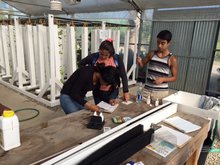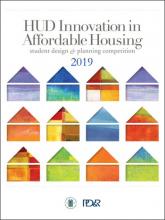Found 433 resources.
0
0
0

Current efforts to end homelessness are largely focused on the immediate housing needs of adults. Yet recent research further demonstrates the importance of addressing childhood, early care, and education in efforts to prevent and end homelessness. This blog post summarizes five new studies. Topics include homelessness in the womb and during infancy; the Adverse Childhood Experiences of homeless adults; the employment of families during and after stays in homeless shelters; and the impact of Rapid Rehousing on the education of children and youth experiencing homelessness.
Topics: Child welfare, Dual-generation, Early childhood, Education, Health, Homelessness, Housing, Low-income, Pre-natal, Research
0
0
0

The Housing Authority of the County of Los Angeles (Calif.) developed an innovative community garden to provide access to affordable and fresh food as well as skills training and job opportunities.
Topics: Community development, Food insecurity, Green, Health, Housing, Low-income, Nutrition, Place-based, Sustainability, Youth
0
0
0
We examine the implementation of a community health worker (CHW) program in subsidized housing, describe needs identified and priorities set by residents, and summarize participant-reported outcomes.
Topics: East Coast, Health, Housing, Low-income, Partnerships, Place-based, Research
0
0
0
Percent of Families with Children Eligible for Shelter Due to Domestic Violence, by Community District (July 2014–December 2015)
Topics: Child welfare, Domestic violence, East Coast, Homelessness, Housing, Low-income, Research, Safety
0
0
0
National estimates are that roughly 80% of homeless mothers with children have previously experienced domestic violence. Even with its strict and limited definition of homelessness, applying this estimate to HUD’s most recent data reveals that over 230,000 children living in shelter have been exposed to the traumatic and long-term effects of domestic violence at some point. At a time when the nation is experiencing a national crisis of child homelessness, we can no longer afford to ignore this critical connection.
Topics: Child welfare, Domestic violence, East Coast, Homelessness, Housing, Low-income, Safety
0
0
0

In January, mothers with substance-abuse disorders will have a long-term resource to help break the cycle of their addiction. That’s when Tucson Medical Center and CODAC Health, Recovery and Wellness, in partnership with the Connie Hillman Family Foundation, open their new transitional housing program in midtown Tucson for mothers who are battling drug or alcohol addiction.
Topics: Homelessness, Housing, Low-income, Partnerships, Safety, Stability, Substance abuse
0
0
0
In contrast to the portrayal of homelessness as affecting people with behavioral health problems or low employment capacity, cycles of homelessness could reflect job shifts that bring a household in or out of poverty. To assess the connections between employment and homelessness, researchers focused on three topics: (1) employment and earnings before, during, and after adults used a homeless shelter; (2) changes in employment and earnings in connection to shelter entry and exit; and (3) employment and earnings differences between adults who are homeless as part of a family versus as...
Topics: Asset building, Homelessness, Housing, Low-income, Research, Stability, Workforce development
0
0
0
CLPHA’s Housing Is Initiative is engaged in a number of cross-sector activities focused on developing partnerships, facilitating a community of practice, resource development, promoting best practices, online collaboration, policy and advocacy, and training and education. Read about recent activities in this Fall Update.
Topics: Child welfare, CLPHA, Community development, Cost effectiveness, Data sharing, Early childhood, Education, Family engagement, Funding, Health, Homelessness, Housing, Low-income, Medicaid / Medicare, Mental health, Partnerships, Place-based, Post-secondary, Research, Stability, Substance abuse, Workforce development, Youth
0
0
0

Some community colleges have found innovative partnerships with their public housing authorities may help combat student homelessness.
Topics: Asset building, CLPHA, Education, Homelessness, Housing, Low-income, Midwest, Pacific Northwest, Partnerships, Post-secondary, Stability, Workforce development
0
0
0

Sweet Water Foundation transformed four blocks in Englewood to cultivate community and help build skills, resources, and opportunities for residents.
Topics: Community development, Family engagement, Food insecurity, Green, Health, Low-income, Midwest, Nutrition, Partnerships, Place-based, Sustainability, Youth
0
0
0
Emergency room visits for homelessness surged at a large urban children’s hospital after Massachusetts made it harder for families to get into shelters, a new study suggests.
Topics: Child welfare, East Coast, Health, Homelessness, Housing, Low-income, Research
0
0
0

Two new research briefs use recent data from the Head Start Family and Child Experiences Survey (FACES 2014) to explore characteristics of children enrolled in Head Start and the leaders and teachers who guide the programs.
Topics: Child welfare, Early childhood, Low-income, Research, School-readiness
0
0
0
Which neighborhoods in America offer children the best chance to rise out of poverty? The Opportunity Atlas answers this question using anonymous data following 20 million Americans from childhood to their mid-30s. Now you can trace the roots of today's affluence and poverty back to the neighborhoods where people grew up. See where and for whom opportunity has been missing, and develop local solutions to help more children rise out of poverty.
Topics: Asset building, Child welfare, Dual-generation, Early childhood, Education, Health, Housing, Low-income, Mobility, Stability, Youth
 Shared by Housing Is
on Oct 12, 2018
Shared by Housing Is
on Oct 12, 2018 0
0
0
Assisted housing mobility is both a housing policy and a civil rights practice, giving low income families participating in our largest federal housing program – the Housing Choice Voucher program – a real choice to move to neighborhoods and communities of their choice, including high opportunity communities from which they have been traditionally excluded.
Topics: Education, Housing, Low-income, Mobility
 Shared by Housing Is
on Oct 12, 2018
Shared by Housing Is
on Oct 12, 2018 0
0
0
Half of public housing authorities (PHAs) are engaged in at least one health initiative, almost all in partnership with the health sector, according to a new report by the Council of Large Public Housing Authorities (CLPHA) and the Public and Affordable Housing Research Corporation (PAHRC).Health Starts at Home: A National Snapshot of Public Housing Authorities' Health Partnerships finds that PHAs are key players in addressing the intersection of housing and health and that deepening partnerships between PHAs and health providers can better serve residents' and communities’ health...
Topics: CLPHA, Dual-eligibles, Health, Housing, Low-income, Medicaid / Medicare, Mental health, Nutrition, Partnerships, Place-based, Preventative care, Research, Seniors
 Shared by Housing Is
on Oct 11, 2018
Shared by Housing Is
on Oct 11, 2018 0
0
0
The NYU Furman Center and Abt Associates have launched LocalHousingSolutions.org, an online, interactive resource to help communities create and implement comprehensive local housing strategies that promote housing affordability. CLPHA was involved with the design of the site as one of forty housing industry stakeholders selected to participate in the National Community of Practice on Local Housing Policy.
Local Housing Solutions offers a new framework for helping cities address affordability challenges as part of a comprehensive and balanced housing strategy. These challenges are complex...
Topics: CLPHA, Housing, Low-income, Partnerships, Research
0
0
0

HUD’s Office of Policy Development and Research (PD&R) is pleased to announce the 2019 Innovation in Affordable Housing (IAH) Student Design and Planning Competition. The competition encourages multidisciplinary graduate student teams to submit innovative solutions for a real-world affordable housing project that incorporate design, planning, finance, and larger community elements.
Topics: Funding, Housing, Low-income, Partnerships, Research
0
0
0
This initiative is generating innovative ideas that will help us address the affordable housing crisis in America and further support our broad mission to create housing opportunities that are safe, sustainable, and affordable, while managing risk to protect lenders, homeowners, and taxpayers.
Specifically, The Challenge is a $10 million commitment by Fannie Mae to generate affordable housing solutions that will help Fannie Mae address the nation’s affordable housing issues by advancing sustainable communities–those providing residents integrated opportunities for employment, health and...
Topics: Education, Funding, Health, Housing, Low-income, Workforce development
0
0
0
Neighborhoods where insecure housing overlaps with higher rates of emergency department use may be promising areas for interventions under Medicaid value-based payment
Topics: East Coast, Health, Housing, Low-income, Medicaid / Medicare, Partnerships, Stability
0
0
0
During this All In webinar, Caroline Fichtenberg of SIREN reviewed the current landscape of assessment tools and outcomes measures for social needs. Karis Grounds of 2-1-1 San Diego explained how they incorporated social needs assessment into their Risk Rating Scale, which helps them better serve clients while showing the impact of their services.
Topics: Data sharing, Health, Low-income, Metrics, Partnerships, West Coast
0
0
0
Opportunity Zones have the potential to make a huge economic impact on disinvested communities across the country. Host Justin Milner speaks with researchers Brett Theodos and Brady Meixell on how this brand-new economic development initiative works, and how we’ll know if it’s truly successful.
Topics: Community development, Low-income, Mobility, Youth
0
0
0
Practitioners working on community safety have increasingly incorporated creative placemaking techniques into their work. Creative placemaking refers to the ways in which arts and culture change how people use the places they share.
Topics: Community development, Criminal justice, Low-income, Out-of-school time, Partnerships, Place-based
0
0
0
The third in a series of Research-to-Impact briefs by Chapin Hall at the University of Chicago on understanding and addressing youth homelessness.
Topics: Early childhood, Family engagement, Home visiting, Low-income, Partnerships, Pre-natal, Research, Youth
0
0
0
Topics: Child welfare, Early childhood, Education, Health, Homelessness, Low-income, Pre-natal
0
0
0
This short document provides basic information to help housing and homeless assistance providers advocate with their families and youth for appropriate educational services, from birth through higher education. The rights and protections outlined here apply to all children and youth experiencing homelessness, as defined by the education subtitle of the McKinney-Vento Act.
Topics: Disabilities, Dual-generation, Early childhood, Education, Family engagement, Homelessness, Housing, Legislation & Policy, Low-income, Post-secondary, Youth

